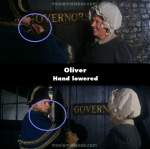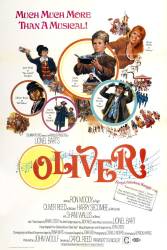Continuity mistake: During the song "I'd Do Anything" Bet's hair is down and then pulled back, then down again at different parts of the song and dance in that scene.

Continuity mistake: When Mr Bumble and the female workhouse employee take Oliver to the Governor's office, Bumble raises his hand and knocks on the door. The woman sings "They will lay the blame on the one who named him", prompting Bumble to move his hand away from the door, toward his face, as if he's about to place it over his mouth in concern. The camera then changes angles and Bumble's hand is suddenly lowered and nowhere near his face.
Continuity mistake: At the outset of the song "Who will buy?", the price of roses is "four blooms for a penny." Then it suddenly doubles to two for a penny.
Revealing mistake: When we first see Oliver Reed, we see his shadow first on the wall at a ramp to the pub. As his shadow spreads its legs, we then see him spreading his legs a moment later. Shadow puppetry was used by the director to give the audience the impression that he is ominous and foreboding before we ever see the man himself. (00:54:10)






Chosen answer: You are correct that "Oliver" does have some material that might be intense for young children - including a murder, some minor violence, issues of adoption, child abuse, kidnapping, and even some sexual content (but only by innuendo). Drinking alcohol is also involved, and some of the characters with whom we are meant to sympathize are, in fact, thieves. But intense content does not necessarily preclude a movie from obtaining a "G" rating. There have been several G-rated movies which have content, including killing, that could be frightening for children, including "Bambi," "The Lion King," "Willie Wonka and the Chocolate Factory," and "The Wizard of Oz," to name a few. In "Oliver," most of the violence is alluded to, and the murder of Nancy is committed out of sight (only Sykes' hand is visible, and Nancy's screams are heard), though it is frightening and realistic. Violence can be permitted in G-rated films, as long as it is "minimal." Sexual innuendo is permitted, in small doses, as long as lewd acts aren't shown. Intense content is also permitted. Drug use is not permitted, but I suppose the tavern scenes are cartoonish enough as to not warrant a more harsh rating. The bottom line is that ratings are determined by the MPAA - Motion Picture Association of America, and that association is given wide latitude and discretion. Apparently, the "mature" content of "Oliver!" was not viewed as rising to a level which the MPAA felt would warrant a more stringent rating.
Michael Albert